OpenAI has introduced a groundbreaking feature called “Memory” for ChatGPT, aimed at enhancing user experience and facilitating more personalized, informative interactions. This feature empowers ChatGPT to remember information across conversations, eliminating the need for repetitive introductions and context-setting, while enriching future dialogues.
Key Features:
Contextual Recall: ChatGPT can remember details and preferences explicitly instructed or inferred from conversations. This allows for:
Personalized Interactions: Tailored responses and suggestions based on individual user preferences and past interactions.
Streamlined Workflows: Remembering meeting note formats, business details, or programming language preferences for improved efficiency.
Enhanced Creativity: Generating content like social media posts or birthday cards based on remembered personal information.
User Control and Privacy:
Opt-in and Opt-out: Users have complete control over the Memory feature, enabling them to turn it on/off or delete individual memories.
Privacy Measures: OpenAI prioritizes user privacy. Memories are stored securely, and sensitive information is only recalled upon explicit user request.
Enterprise and Team Benefits:
Improved Collaboration: Team members can share and leverage collective knowledge stored in ChatGPT’s memory.
Streamlined Workflows: Retained preferences for tasks like report generation and coding enhance team productivity.
Availability and Future Plans:
Initial testing with select free and Plus users, with broader rollout planned for Enterprise and Team users.
Memory capabilities to be introduced to other GPT models in the future.
OpenAI’s Memory feature marks a significant advancement in AI chatbots, paving the way for more natural, personalized, and efficient interactions. This technology holds immense potential for both individual users and organizations, streamlining workflows, enhancing creativity, and fostering deeper engagement.






